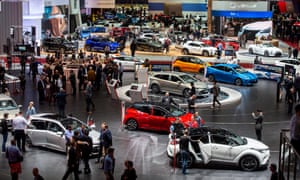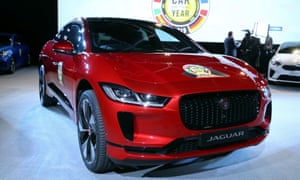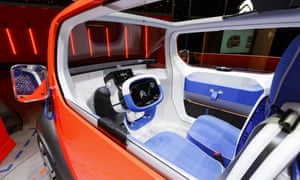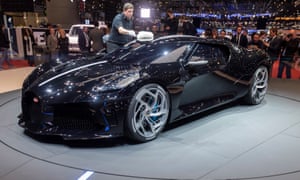
Carmakers gathering at the annual Geneva motor show this week were hoping the Alpine spring air and customary launches of new models would be a springboard for an industry fightback.
Some of the world’s largest manufacturers have stumbled in the past 12 months, with sales under pressure on various fronts, particularly in Germany’s giant car industry. Ford and Jaguar Land Rover skipped the show after announcing thousands of job cuts in January.
Concerns in Europe over pollution have led to tighter restrictions on diesel cars and an ensuing dent in sales, and the Chinese market on which many manufacturers rely for growth shrank during 2018 for the first time in decades.
Then there is Brexit. It hangs over manufacturers with British operations and the many more who sell to one of the world’s most lucrative car markets.
Here are six things we learned at the show.
1 Brexit concerns
This year’s gathering was the last before Brexit day on 29 March, and with only three weeks to go and the political mood pointing to either an extension of the negotiation period or no deal at all, carmakers’ warnings reached a new pitch of alarm.
BMW gave a clear signal that a no-deal Brexit, in which trade defaults to World Trade Organization terms, including tariffs on cars and parts, could prove destructive for the British car industry. BMW’s Mini brand would face a “huge burden”, according to the board member Peter Schwarzenbauer, which might make it consider moving out of its Cowley plant in Oxford.
Top executives from Toyota, Bentley and Vauxhall’s owner, PSA all expressed similar concerns about short and longer-term costs if barriers to trade between the UK and EU are erected.
Maxime Picat, PSA’s operational director for Europe, said: “It’s difficult for me to imagine that you can rebuild a UK automotive industry, self-centred, looking only at the UK.”
2 Electric cars are gaining momentum
Despite JLR’s recent travails and its absence on the showroom floor, the victory of the Jaguar I-Pace in the coveted European car of the year award underlined one of the key trends in Geneva, the quickening pace of electrification as the price of batteries falls and demand for zero-emission vehicles rises.

The I-Pace’s success set the stage for a range of models that rely on battery technology. Peugeot unveiled an electric version of its 208 supermini aimed at the mass market, Renault said its new Clio would have a hybrid option and the Volvo-owned Polestar 2 saloon is aiming for the same customer base as the US battery pioneer Tesla.
Volkswagen, which is trying to move on from the emissions-cheating scandalthat accelerated diesel’s decline, unveiled a beach buggy vehicle as part of the electric ID range, which will be in dealerships in 2020.
3 Autonomous vehicles are coming – but not yet
Motor shows are still monuments to the consumer dream of owning and driving one’s own car but the coming shift to driverless vehicles is starting to register, even if the technology is not quite there yet.
The German company e.Go Moove aims to produce almost fully autonomous minibuses by the middle of the next decade. Aston Martin’s sister brand, Lagonda, said it wanted its autonomous SUV to roll off its Welsh production line in 2022.
While we await fully autonomous technology, Citroen’s Ami One concept takes a different approach to city mobility. The low-powered car would be picked up by anyone – even without a licence – using an app, in a similar way to city cycle hire schemes.

4 The world’s most expensive new car
At the luxury end of the market carmakers face completely different challenges in attracting customers. The French supercar maker Bugatti’s gambit at Geneva was nothing less than the world’s most expensive new car,La Voiture Noire, a one-off extravagance for an unnamed buyer priced at €11m (£9.5m).
Stephan Winkelmann, Bugatti’s president, said the car represented extreme luxury, with a black carbon fibre body and a 1500-horsepower, 16-cylinder engine.

5 Luxury cars have to be seen – and heard
Despite the hype over the gas-guzzling Bugatti, electrification is coming even at the very top end of the market. The Italian marque Pininfarina introduced the Battista all-electric hyper car, which can accelerate from 0 to 60 mph within two seconds.
The challenge for luxury manufacturers is the timing of the inevitable change to electric. “We want to sell clean, high-power petrol engines for as long as we can,” said Bentley’s chief executive, Adrian Hallmark. Aside from carbon dioxide, however, the company still has another important output from internal combustion to work on, engine noise.
Designers are focused on identifying the all-electric experience that will prompt drivers to shell out hundreds of thousands of pounds on a car. “We are in the entertainment industry, at the end of the day,” said McLaren’s chief financial officer, Paul Buddin. “It’s about how you feel when you’re driving the car.”
6 Old habits die hard
Even Formula 1 racing bowed to the inevitable and got rid of its “grid girls” last year but a minority of exhibitors at Geneva appear to have missed the memo that having conspicuously young and tightly clothed women on their stands tends to be frowned upon.
With the uncomfortable exception of Fiat Chrysler Automobiles, most of the big brands have stamped out the practice. More niche brands, however, still featured the occasional throwback. The luxury car modifiers Mansory and Klassen, Pininfarina and the tyre makers Yokohama and Pirelli – maker of the infamous calendars – all featured models with expressions of intense boredom posing for men’s photos.
When democracy and data privacy…
… come under threat, we must keep challenging those who undermine it. It’s been a year since The Observer and The Guardian broke the story that became the Cambridge Analytica scandal, exposing the truth and shedding light on the reality of foul play within the tech industry. We saw how personal data could be harvested on an unprecedented scale to fulfill the ambitions of the powerful. Through this courageous investigative reporting, we shamed Facebook, and prompted a global conversation about the importance of data privacy, holding tech companies to account and pressuring governments to enact regulation.
The Guardian is committed to continuing this vital work; we will keep persevering, uncovering and challenging those with so much power in the tech industry. This has never been so pressing: we’re living in a time when the integrity of our democracy and the legitimacy of our votes are in question. Political campaigns reside in our many digital feeds and, with each year, this will become ever more prominent. The world needs journalism that promotes transparency and investigates where others won’t go. Reader support means The Guardian can keep investigating the critical issues of our time.
The Guardian is editorially independent, meaning we set our own agenda. Our journalism is free from commercial bias and not influenced by billionaire owners, politicians or shareholders. No one edits our editor. No one steers our opinion. This is important as it enables us to give a voice to those less heard, challenge the powerful and hold them to account. It’s what makes us different to so many others in the media, at a time when factual, honest reporting is critical.
Every contribution we receive from readers like you, big or small, goes directly into funding our journalism. This support enables us to keep working as we do – but we must maintain and build on it for every year to come.
[“source=theguardian”]




